
Slate is an Amazon affiliate and may receive a commission from purchases you make through our links.
The Overlooked Books of 2013
Slate Book Review critics suggest 19 great books you never heard about—but should’ve.
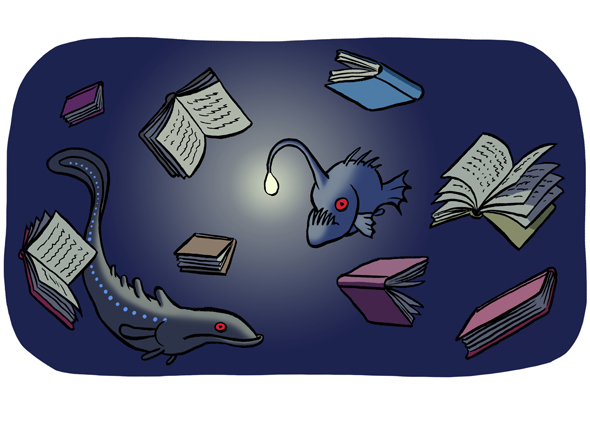
Illustration by Frederik Peeters
Monday: Slate staffers pick their favorite books of 2013.
Tuesday: The overlooked books of 2013.
Wednesday: The best lines of 2013, and the best poetry of 2013.
Thursday: Dan Kois’ 15 favorite books.
Friday: The Slate Book Review Top 10.
The Slate Book Review runs just 15 pieces a month. But when 33 books are published every hour, it’s hard to keep up. We asked SBR writers what 2013 titles they felt were criminally underappreciated. Check out the buried treasures they unearthed.
Noah Berlatsky recommends Swans and Klons, by Nora Olsen
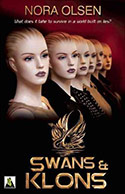
Nora Olsen's novel Swans and Klons is billed as lesbian YA, but it has less in common with adventure stories like Harry Potter or The Hunger Games than it does with the high-concept science fiction of folks like Ursula K. Le Guin or Philip K. Dick. Set in a world where men are rendered childlike by a genetic plague and women reproduce through cloning, the book is a meditation on the nature of difference between genders, classes, and cultures. A lesbian novel that makes an impassioned plea for the humanity of men and a coming-of-age story that embraces as a moral touchstone the treatment of those who never grow up, this is a subtle, intelligent, and beautiful book, whatever your age, gender, sexuality, or difference.
Geeta Dayal recommends Earth Sound Earth Signal, by Douglas Kahn
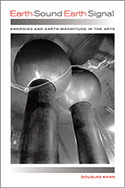
Thomas Watson, Alexander Graham Bell’s assistant, tuned into otherworldly radio sounds at night, long before radio was invented. Watson was hearing “natural radio,” the sounds of the Earth, pinging through telephone lines. In this intriguing book, Douglas Kahn, the sound scholar and author of Noise Water Meat, traces how the Earth’s energies permeated the arts. Earthquakes, outer space, and atomic explosions all figure in to Kahn’s wide-ranging story. He discusses 20th-century art and music—from the cosmic light art of James Turrell to the brainwave compositions of Alvin Lucier—reading the works through a broader narrative of electromagnetic energies.
Michelle Dean recommends Men We Reaped, by Jesmyn Ward
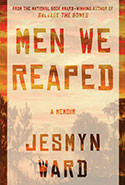
I keep waiting for the discussion to explode on this book, a memoir from National Book Award winner (for Salvage the Bones) Jesmyn Ward. It's a beautiful treatment of the young black men from Ward's hometown in Mississippi who were "reaped" by poverty and hopelessness of the rural South. That is a sort of person that literature doesn't address often enough, let alone address with the beautifully ambivalent lyricism that Ward does. I can't help feeling it'd be a better world if books like this provided the sparks for public discussion that, say, Jonathan Franzen's latest musings on social media could.
Jiayang Fan recommends Wealth and Power, by Orville Schell and John Delury
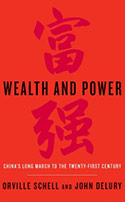
2013 has been a tumultuous year for Chinese politics, what with the blockbuster trial of ousted Party chief Bo Xilai and breakthrough reforms proffered by the country’s new president, Xi Jinping. For outsiders, it is one thing to read the headlines and quite another to comprehend their significance. Orville Schell and John Delury’s informative and insightful analysis of Chinese struggle for social and economic progress is a must-read for anyone with an interest in the world’s fastest rising superpower because it contextualizes the country’s changes within a larger historical continuum and explains the pragmatic precept by which the most recent crop of Chinese leaders live: “If a wise ruler masters wealth and power, he can have whatever he desires.”
Jonathan Farmer recommends The Poet Resigns: Poetry in a Difficult World, by Robert Archambeau
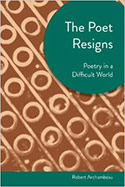
Before I read The Poet Resigns, I might have started this by noting that most readers succeeded in overlooking pretty much any book I could have picked. But Archambeau presents a complex and convincing case for the ways in which the current situation of poetry springs from and responds to its economic and cultural context—one which makes such ahistorical gripes seem lazy. That Archambeau does this and much more in prose that's consistently welcoming, curious, and free of the anxiety that marks so much criticism more than makes up for its occasional redundancy.
Cate Fricke recommends Six-Gun Snow White, by Catherynne M. Valente
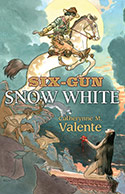
A smart and elegantly written tall tale, Six-Gun Snow White follows in the tradition of Angela Carter to deliver not only a thrilling Western retelling of the ubiquitous fairy tale, but an exploration of womanhood displaced. Like so many fairy tales, this is a story of abuse and survival, in which finding a prince isn’t the end game: In this world of silver barons, gunslingers, and wronged women, rebuilding a life on one’s own terms, in new territory, is the quest. Fans of Valente’s popular books for middle grade readers will find denser prose and more violent fare in these pages, as the author strips the classic story down to its raw, wounded heart.
Jenny Hendrix recommends Fra Keeler, by Azareen Van der Vliet Oloomi
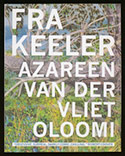
A disorienting look at monomania, this slim, chilling novel explores an anonymous narrator’s investigation into the death of the titular Fra Keeler, an obsession that quickly turns everything outside his own body into a portent of death and disturbance. Oloomi enters so fully and sympathetically into the mad logic of her narrator that scenic detail, chronology, cause and effect, and even such mundane props as cactus, mailman, and ringing phone are bent, doubled, or subsumed by the paranoid geometries of meaning he draws. “Not like a light bulb, I thought, this cactus … It is a green mass of death, I thought.” Reality, as in Alain Robbe-Grillet’s La Jalousie, can only enter the novel slantwise, in streaks. Subtly menacing, but not without humor, the novel derives momentum and tension from the space between its clear, intelligent language and the absolute unreliability of its narrator.
Jane Hu recommends Curious Subjects: Women and the Trials of Realism, by Hilary Schor
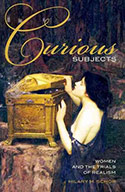
The joke about overlooked academic books is that they might actually all be overlooked. It’s a shame too. For while readers might rightly circumvent esoteric and problematic texts in avoiding academic publications, they also miss out on what can often be rich, creative, and profoundly relevant scholarship as well. USC Literature professor Hilary Schor’s newest book Curious Subjects: Women and the Trials of Realism came out in January and it is a dazzling, funny, and overwhelmingly insightful exploration on a fundamental theme—that of female curiosity—which pervades realist fiction as well as life more generally. Schor examines Charles Dickens and George Eliot alongside the more unlikely Marquis de Sade, and while reading how carefully Schor follows her curious subjects through their plots, you will find yourself too growing as a reader: a more generous and curious one. The end of her opening paragraph exemplifies the clarity and fun in Schor’s prose: “The princess walked on roads and rode in automobiles and went wherever she pleased and did whatever she liked, and in all the land there was only one law, and it was ‘Thou shalt not be curious.’ ” Intrigued yet? You’ll want to keep reading, I promise.
Dan Kois recommends The Next Time You See Me, by Holly Goddard Jones
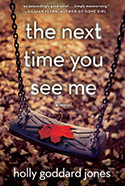
A serious and thoughtful first novel from a bright young author with a real sense for small-town life. Jones pays close attention to her characters: A shy high-schooler with a secret; a forgotten factory worker glimpsing his first chance at affection in a long time; a schoolteacher in search of her missing, hard-drinking sister. But Jones is also unafraid of a juicy, enjoyable plot, and the result is a heartfelt mystery that’s as sad as it is nerve-wracking.
J. Bryan Lowder recommends An Honest Ghost, by Rick Whitaker
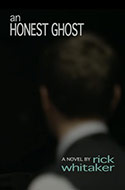
Whitaker ends the first chapter of this remarkable book with a line from Christopher Priest: “This is my own story, told in different voices.” An apt introduction given that the author constructs his hypnotic autobiographical novel entirely of quotations drawn from more than 500 volumes, all in his personal library. Indeed, though Ghost is a story with characters and plot, it’s also the memoir of an impenitent bibliophile, his visions of unexpected fatherhood and domestic life ineluctably bound up in well-worn bindings. But you don’t necessarily need to throw yourself into the literary rabbit-hole mismarked as an appendix of sources to appreciate this book: After all, every writer hosts voices in her head—Whitaker is just being honest about the many haunting his.
Nick Lund recommends The Crossley ID Guide: Britain and Ireland, by Richard Crossley and Dominic Couzens
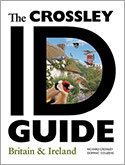
I’ve never been to the U.K. and, frankly, it’s not high on my list of places to go birding. But thanks to Crossley’s innovative system of presenting species on a background of their favorite habitats, I feel I know the countryside pretty well. Grouse stomp along on foggy moors, bullfinches flit in shady gardens, gulls squat among pasty beachgoers on holiday—it fills in the landscapes left out in Monty Python’s Flying Circus and The Office. I’ve not only learned the birdlife of the U.K. and Ireland, I’ve taken a vacation there—without having to eat any of the food.
Tammy Oler recommends Hawkeye, Vol. 1: My Life as a Weapon, by Matt Fraction, David Aja, and Javier Pulido
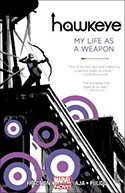
Matt Fraction’s superb Hawkeye series imagines what sharpshooter Clint Barton (aka Hawkeye) does when he’s not saving the world with the Avengers. Unlike his superpowered counterparts, Barton is a regular guy with one super skill (and a lot of poor ones, like relationship and people skills) who struggles to figure out what it means to be an ordinary good guy. Fraction’s smart writing comes to life in stunning art and innovative panel layouts, making Hawkeye deeply entertainingly and moving. Hawkeye nabbed an Eisner award nomination this year and is lauded among comics readers, but it deserves a wider audience—especially among readers skeptical about what superhero comics have to offer.
Cara Parks recommends Parasite, by Mira Grant
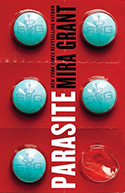
Would you allow a 2-pound parasite to be implanted in your body? What if it ended a deadly allergy? Or controlled your diabetes without insulin? Or provided free birth control? In Grant’s near future, millions of people have decided their innate disgust for parasites should be set aside for the countless benefits of the Intestinal Bodyguard, a genetically manipulated worm capable of curing countless human afflictions with seemingly no side effects. Sally Mitchell owes her life to such an implant after a terrible accident; her miraculous recovery brings her into the gaze of the powerful pharmaceutical company SymboGen, which manufactures the worms. Don’t worry about figuring out the “plot twist” very early on (it’s served up on a silver platter); the goal here is not a gotcha ending but a window into the evolution of our limited narrator’s understanding of the grotesque implications of these medical advances. In a year where debates over the uses and abuses of health care has loomed large, Grant, despite a few stumbles, delivers a claustrophobic, squirm-inducing tale that manages not to get bogged down in polemics. Also, zombies.
Chelsey Philpot recommends God Got a Dog, by Cynthia Rylant with illustrations by Marla Frazee
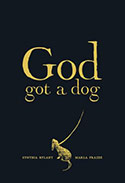
“It was the weirdest thing./ God got all religious/ on Herself.” This collection of poems is what children’s librarians call a “special book.” The audience is unclear. It’s quiet and quirky, contemplative and charming. It's the kind of book you would recommend to daydreaming kids and the whimsy-prone adults they grow up to be. In her verses, Newbery Medal winner Rylant imagines what would happen if God were a regular Joe or Jane just like the rest of us. Her God goes to beauty school, makes spaghetti, adopts a dog, finds happiness in simple things, watches TV, and doesn’t like eating alone. Frazee’s pencil and gouache illustrations are warm, whimsical, and filled with wonder.
Marian Ryan recommends The Faraway Nearby, by Rebecca Solnit
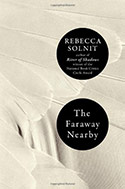
Bruised by years of emotionally exhausting and factually dubious memoirs, some of us have developed burnout. With The Faraway Nearby, Rebecca Solnit brings a welcome coolness and control to the form, blending in literary analysis and nature writing as she goes. By close-reading a range of stories, from the Brothers Grimm to Frankenstein and The Motorcycle Diaries, and examining a confined set of contrasting images—mostly a vast pile of rotting apricots she receives from a brother and the enveloping snow and ice of the Arctic—she manages, circumspectly, to evoke several seasons’ worth of tumult in her life as she confronts her changed relationship with a difficult mother as well as her own mortality. Images of spinning and weaving also run through the book, underlining Solnit’s ideas about how and why we make stories of our lives, and her unshaken belief in human connectedness.
Alizah Salario recommends Mira Corpora, by Jeff Jackson
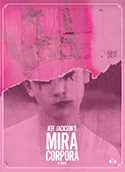
Jackson’s debut novel is a piercing howl of a book. Based on journals the author kept while growing up, Mira Corpora chronicles the wayward existence of Jeff, an adolescent who leaves his abusive mother only to find a different caliber of savagery on the road. Why more critics haven't fallen for Jackson’s slyly seductive and utterly gripping voice is a mystery to me—his prose practically crackles and sparks. Like his journey, the narrative is fragmented, a bit fuzzy, and runs on full-throttle the entire time. This punk coming-of-age story smolders long after the book is through.
Ted Scheinman recommends Latin: Story of a World Language, by Jürgen Leonhardt (translated from the German by Kenneth Kronenberg)
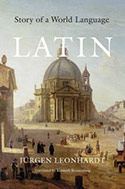
Given that the newly mitred Pope Francis is a freak for Latin, and that the Vatican's two most recent Latin czars have been clerics from the American Midwest, stateside Catholics and Latin nerds alike should be frothy-mouthed at the new, significantly expanded edition of Jürgen Leonhardt's Latin: Story of a World Language, translated with elegance by Kenneth Kronenberg. Yes, I have extolled the virtues of spoken Latin in this very publication and cannot therefore claim impartiality on the subject. Nevertheless, please believe that Leonhardt's tour through Latin's post-Roman afterlives, and his own experience speaking the language, galvanize a very neat argument that blends a linguistic approach (which has pronounced Latin dead) with a cultural-historical approach (by which standard Latin is merely decrepit!). Learned and accessible, the book is stuffed with funny little anecdotes, from early Arab scholars grappling with the language to Angelina Jolie getting quod me nutrit me destruit tattooed on her lower abdomen.
June Thomas recommends Return of a King: The Battle for Afghanistan, 1839-42, by William Dalrymple
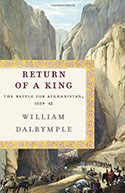
Like most general readers, I imagine, I was drawn to Return of a King by the parallels between this 19th-century conflict and the ongoing war in Afghanistan. They’re there, and they’re unbelievably depressing, but the book has so much more to offer. It’s a model of scholarship—Dalrymple drew on on sources found in Russia, India, Pakistan, and Afghanistan, many of which had never before been translated into English—but it’s also great popular history. Many of the players—from a British regiment that brought its foxhounds to the battlefield to a bevy of shockingly incompetent officers—are larger-than-life characters who could have been ripped from a George MacDonald Fraser adventure story.
Adrian Van Young recommends A Questionable Shape, by Bennett Simms
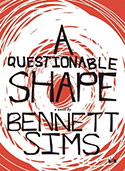
In a decade where hyper-literary, self-aware genre fiction is gnashing its blood-foamed teeth with relish—Zone One by Colson Whitehead, Red Moon by Benjamin Percy—it’s curious that Bennett Simms’ understated novel of yearning and malaise in the aftermath of a zombie apocalypse didn’t garner more attention.* Equal parts David Foster Wallace and Richard Matheson, Simms’ novel follows its narrator on an existential quest to find his friend’s father through a suburban Baton Rouge decimated by hordes of maundering undead, who bear a disquieting resemblance to the wages of Hurricane Katrina. Meanwhile, whatever footnoted observations that the narrator deems apropos “dig graves in the text … disturbing it from beneath, such that if the text were ever infected, they are the words that would guide it.” A Questionable Shape is certainly the first Proustian zombie novel, but hopefully not the last horror novel of ideas.
Correction, Dec. 3, 2013: This article originally misstated the title of Colson Whitehead's novel Zone One.
Correction, Dec. 4, 2013: This article originally misspelled Azareen Van der Vliet Oloomi's first name.
---
See all the pieces in this month’s Slate Book Review.
Sign up for the Slate Book Review monthly newsletter.